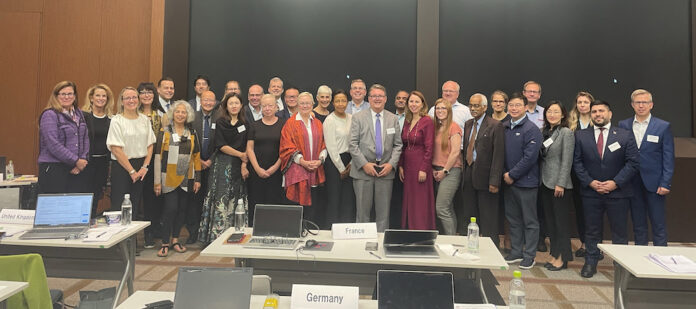Created in response to the results of a National Geographic survey, the 1990s television show – and corresponding board game – “Where in the World is Carmen Sandiego?” was enormously popular. Each episode had contestants who competed by answering geography-related trivia questions to determine where Carmen was. Complete with its own theme song performed by Rockapella, the show’s popularity was lauded with Emmy and Peabody wins. While intended for children, figuring out where Carmen was hiding became water-cooler conversation for adults too.
Fast-forward to 2024. Can you point to Azerbaijan on the globe? Channeling my best Carmen Sandiego, it’s one of the places where I spoke earlier this year at the World HR Summit. The topic? Digital Transformation, specifically the future of learning & development. Our spirited discussion at the conference featuring esteemed colleague Dave Ulrich focused on what skills HR teams need to develop in the next 1-3 years to successfully leverage AI. Not surprisingly, we also covered the importance of ISO/TC 260 in the development of global HR standards that can adopted, regardless of country or company size and complexity. More on that later.
AI has been top-of-mind for many in 2024. Earlier this year, I joined the University of Louisville College of Business’s Inaugural CHRO Roundtable on this topic, during which we discussed the promise of AI in HR: the concerns, the opportunities and common use cases. When the chance to talk about AI at NHCCE 2024 in Malaysia, I jumped at the chance. That conference’s theme spotlighted humanizing AI for the future workforce and the audience was very eager that their employers help workers reimagine work. By sharing ideas about how to get employees into their “zone of genius,” we bridged the commonalities that technology and change sometimes make feel like discords instead.
Integral to our work around the globe are new collaborations. In September, I was thrilled to represent HRCI as a full member of the North American Human Resource Management Association (NAHRMA) – the official representative to the World Federation of People Management Associations (WFPMA), a global network comprised by over 90 national human resource associations and representing more than 550,000 people management professionals – during their World Congress on People Management event in Mexico. This membership allows us to participate in the research conducted by WFPMA while also enabling HRCI to collaborate with other leading associations to promote best practices that benefit HR professionals everywhere.
I headed to Cyprus for The Future of Work and Wellbeing 2024 event in October. Supported by the European Association of Human Resource Management (EAPM) and hosted by WFPMA, this prestigious conference covered crucial HR topics including global trends in the future of work, how HR leaders can guide their organizations through change, and how we can come together across geographical boundaries and diverse sectors to enhance our collective impact. Immediately following the event was a meeting of the WFPMA, which involved selecting the next world congress in 2026 and reigniting the strategic planning efforts. Representatives were also encouraged to share WFPMA’s open access journal, a valuable resource that can be accessed at https://www.ijhrdppr.com/
My final international trip of 2024 took me to Tokyo for the latest International Organization for Standardization Technical Committee 260 meeting. ISO/TC 260 sets the standards for the field of human resource management, standards that promote the alignment mentioned earlier. To date, 64 countries in total are involved with ISO/TC 260, with 38 actively engaging in developing standards. Among the completed global HR standards that support our profession are guidance for an HR Vocabulary, Workforce Planning, Governance and Recruitment. Work-in-progress includes human resource management systems, workforce allocation and data quality and metrics for D&I and L&D. Their guidance also helps HRCI create courses like our Certificate in D&I in HR Management – Assessment, Inclusion, and Retention, based on ISO 30415:2021.
2024 even brought HRCI to our own backyard. Andre Allen, GPHR, our board chair, and I had the honor of joining business, labor and government leaders at the White House. Supporting the importance of National Recovery Month, an observance that promotes new evidence-based treatment and recovery practices for employees struggling from substance abuse disorders. It was a prime example of how the public and private sectors can work together to build stronger workforces.
There’s no doubt that 2024 has been a wild ride, filled with opportunities, new collaborations, and a deepening focus on the importance of HR globally. We’re gratified to be at the forefront of helping our HRCI community redefine, reimagine, and reach for the stars through world-class learning and recognized global standards.

